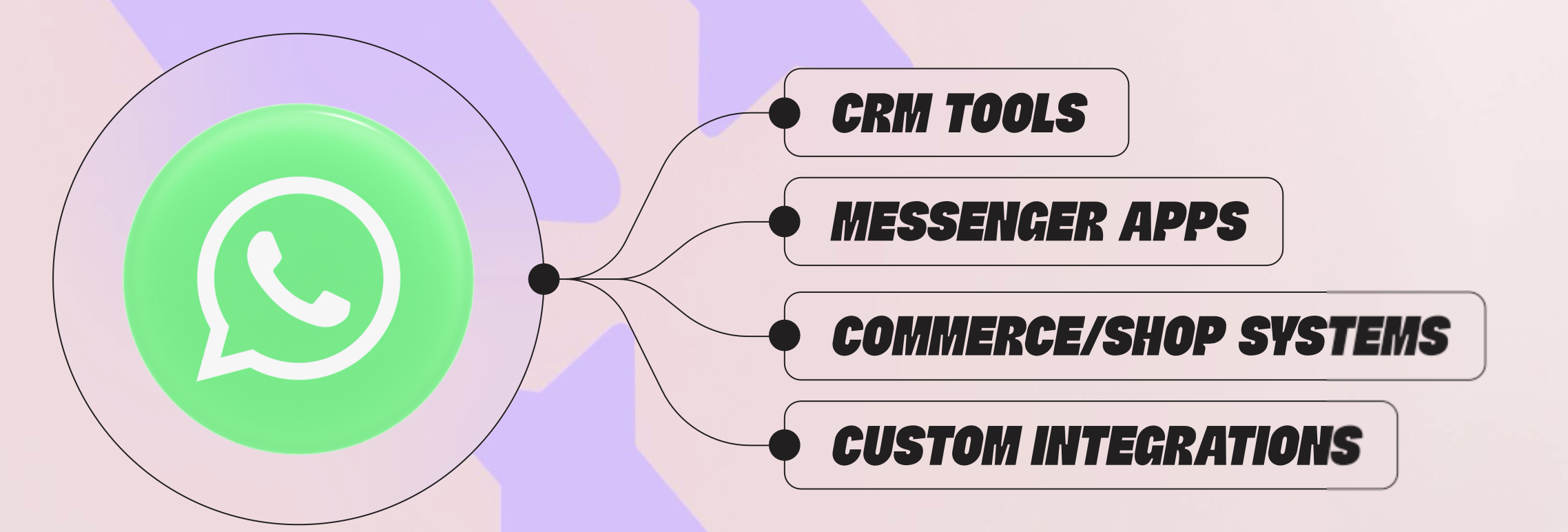By Typie
WhatsApp marketing assistant
WhatsApp Marketing
,WhatsApp CRM
Discover the game-changing potential of integrating WhatsApp with your CRM. Combine both for seamless customer interactions and unprecedented ROI. Read on to learn how.
Ever wondered how you can talk to your customers as easily as you text your friends?
Say hello to WhatsApp CRM, the bridge between personal chats and professional relationship management.
This isn't just about sending emojis and GIFs (though, let's be honest, that's pretty cool too); it's about leveraging the world's most popular messaging platform to boost your business's bottom line.
And it's about using WhatsApp automation to do the hard work for you – earning you money in the background while you get onto other things.
In this article, we'll explore how to blend the art of conversation with the science of CRM.
What you'll learn:
- Adding WhatsApp to the CRM mix
- How to integrate WhatsApp with CRM
- CRM WhatsApp integration
- CRM and WhatsApp Business
- Benefits of WhatsApp API and CRM
Adding WhatsApp to the CRM mix
Integrating CRM with WhatsApp is like adding a turbocharger to your customer interactions.
It’s not just about keeping track of conversations; it’s about creating meaningful connections that drive loyalty and sales.
For instance, charles helps European brands turn WhatsApp chats into goldmines of opportunity, with tools designed for revenue-first strategies.
Explore how charles integrates WhatsApp with Klaviyo.
How to integrate WhatsApp with CRM
Step by step, we’ll walk you through integrating WhatsApp with your CRM, ensuring no customer query goes unanswered and every sales opportunity is seized.
Remember, the key is to choose a platform like charles that simplifies this process, turning tech headaches into a walk in the park.

Simplifying integration: A visual guide
CRM WhatsApp integration
Integrating WhatsApp into your CRM strategy opens up a world of possibilities.
From automated responses to personalized shopping experiences, the goal is to make every customer feel like your only customer.
-
Choose the right WhatsApp Business Solution Provider: The first step is selecting a provider that bridges the gap between WhatsApp and your CRM software. Look for a solution that offers robust API integration capabilities, like charles, which can securely sync your CRM data with WhatsApp conversations – for example with our Klaviyo partnership.
-
Set up your WhatsApp Business API: Once you've chosen your provider, you'll need to set up a WhatsApp Business API account. This account is your ticket to automating conversations, sending bulk messages, and providing customer support at scale – features that aren't possible with the WhatsApp Business app.
-
Map out your customer journeys: Before integrating WhatsApp into your CRM, outline the customer journeys and touchpoints where WhatsApp interaction could be beneficial. Whether it's sending a welcome message, order updates, or support FAQs, knowing where these interactions fit into your customer's journey helps tailor a more personalized experience.
-
Sync your CRM data: Integration magic happens when your CRM data talks to WhatsApp. Use the API to sync customer profiles, past purchase history, and interaction logs. This ensures that every message sent via WhatsApp is informed and personalized, significantly enhancing the customer experience.
-
Automate and personalize your conversations: With your CRM data integrated, you can now automate WhatsApp messages based on customer behavior and preferences noted in your CRM. From personalized product recommendations to timely support messages, automation can help scale your engagement efforts without losing the personal touch.
-
Train your team and set guidelines: Ensure your customer service and sales teams are well-versed in using WhatsApp as part of their communication toolkit. Set clear guidelines on tone, response times, and the types of messages suitable for WhatsApp to maintain consistency and professionalism.
-
Analyze and optimize: Integration isn't a set-and-forget process. Regularly analyze the effectiveness of your WhatsApp messages – looking at return on conversation, open rates, response times, and customer satisfaction scores. Use these insights to refine your approach and improve the integration between WhatsApp and your CRM. See 5 key WhatsApp metrics here.
charles and Klaviyo joined forces in 2023 and are now the power couple of WhatsApp CRM in Europe
Watch the charles x Klaviyo DMEXCO masterclass
See our DMEXO masterclass about how Klaviyo and WhatsApp work together to power up Wormland's CRM:
Description: There’s a new power couple in town: WhatsApp and email. As innovative German fashion brand, Wormland, is finding, these channels work beautifully together to cover all its marketing bases. Where email engages, WhatsApp commands attention. Where email is highly segmented, WhatsApp is personalized. Where email drives a third of revenue, WhatsApp has triple the open rates. Get the inside story from Wormland’s CEO, Tim Kälberer, together with software pioneers Klaviyo and charles, and leave knowing how to use this winning combination to boost your customer lifetime value (CLV).
Useful links for further reading:
- Automating WhatsApp conversations with Journeys
- WhatsApp Business API overview
- The rise of messaging in consumer engagement: what brands should know (Forbes)
See real-life success stories of CRM WhatsApp integration on our customer stories page.
CRM and WhatsApp Business
WhatsApp Business isn’t just a platform: it’s a powerhouse for personalizing customer interactions.
Teamed with the WhatsApp API and the charles platform, you benefit from rich features that make your brand stand out, ensuring your messages are read, remembered and responded to in a timely manner.
Here's a look at how WhatsApp CRM differs from traditional CRM channels like email.
| Factor | Traditional CRM channels | WhatsApp Business (API) CRM |
| Communication style | Formal and often 1-way. | Conversational and 2-way, mimicking a personal chat. |
| Engagement rate | Lower engagement due to saturation and perceived intrusiveness. | Higher engagement rates due to personal touch and immediacy. |
| Message open rates | Open rates can be lower, especially for emails. | WhatsApp messages boast high open rates, often above 90%. |
| Response time | Response times can be longer, leading to frustration. | Instant or near-instant responses enhance customer satisfaction. |
| Personalization | Limited by the channel's format and data integration capabilities. | Highly personalized based on user interactions and data. |
| Customer preference | Customers are increasingly averse to traditional channels like email and phone calls. | Preferred by a growing number of customers for its convenience and familiarity. |
| Automation capabilities | Generally supports automated responses but may lack context. | Supports smart automation with personalized and contextual interactions. |
| Multimedia support | Limited. For example, email attachments can be cumbersome. | Rich support for images, videos, voice messages, and documents. |
| Cost | Can be high, especially for phone support with live agents. | Cost-effective, especially with the use of automated responses and chatbots. |
| Integration with other systems | Typically well-supported, but integration complexity can vary. | Seamless integration with CRM systems via WhatsApp API, enriching customer profiles. |
| Data privacy and security | Generally secure, but dependent on the platform's standards. | End-to-end encryption ensures high levels of security and data privacy. |
| Global reach | Can be limited by channel popularity and accessibility in different regions. | WhatsApp's global user base provides extensive reach. |
| Tracking and analytics | Comprehensive, though dependent on the CRM system's capabilities. | Detailed analytics on message delivery, read status, and customer interactions. |
The new age of customer interaction: traditional CRM vs. WhatsApp Business CRM.
Benefits of WhatsApp API and CRM
Using the WhatsApp API for CRM means you can automate, analyze, and engage like never before.
-
Enhanced customer engagement: WhatsApp's familiar and user-friendly interface makes it an ideal platform for engaging customers. By integrating it with a CRM, businesses can personalize communication based on customer data, ensuring messages are relevant and timely. This results in higher engagement rates and customer satisfaction.
-
Streamlined communication: The integration allows for all customer interactions on WhatsApp to be captured and organized within the CRM system. This ensures that customer service agents have a comprehensive view of each customer's history, preferences, and past interactions, allowing for more informed and efficient communication.
-
Automated workflows: With the WhatsApp API, businesses can automate various communication workflows, such as sending out notifications, reminders, and updates. When integrated with CRM, these workflows can be tailored based on customer segmentation and behavior, making them more effective.
-
Improved response times: The immediacy of WhatsApp, combined with the organizational efficiency of CRM systems, significantly reduces response times. Automated responses, triggered by specific customer actions or inquiries, ensure customers receive instant acknowledgments and solutions.
-
Increased conversion rates: Personalized and timely communication facilitated by the WhatsApp API and CRM integration can lead to higher conversion rates. Businesses can use the platform for not just support but also for promoting offers, new arrivals, and reminders, directly influencing purchasing decisions.
-
Comprehensive analytics: Integrating WhatsApp with CRM enables businesses to track and analyze communication effectiveness. Metrics such as message open rates, response times, and customer satisfaction scores can be monitored to continually optimize messaging strategies.
-
Data security and compliance: With WhatsApp's end-to-end encryption and CRM's data management policies, integrating the two ensures that customer interactions are secure and compliant with data protection regulations. This is crucial for maintaining customer trust and adherence to legal standards like GDPR (DSGVO).
-
Scalability: As businesses grow, the integration scales to accommodate an increasing volume of customer interactions without compromising on quality. This scalability ensures that businesses can continue to deliver personalized customer experiences, regardless of their size.
-
Cost efficiency: Automating routine communications and organizing customer data efficiently reduces operational costs. The integration also helps in utilizing the full potential of both platforms without the need for additional resources. See more on saving costs in WhatsApp.
78% of customers are already messaging with brands on Facebook Messenger, Instagram or WhatsApp—and they love it because today's consumers value quick, direct communication
Forbes
Learn about the WhatsApp Business API here.
To sum up: WhatsApp CRM is a must for brands today
WhatsApp CRM is more than a buzzword; it's a transformative tool for businesses ready to embrace the future of customer interactions.
With the right strategies and solutions like charles, you can turn chats into channels of profit and loyalty.
Enterprise brands that grab the WhatsApp CRM opportunity will benefit the most. charles is a leading European platform focused on ROI and efficiency for global brands.
Ready to revolutionize your customer relationships? It’s time to chat.
Let's kick off your WhatsApp CRM strategy
Want to learn how WhatsApp CRM can transform your business? Get a 30-minute demo with one of our experts and start your journey to enhanced customer engagement and ROI.
FAQs about WhatsApp CRM
What is WhatsApp CRM?
WhatsApp CRM integrates WhatsApp with customer relationship management tools – allowing businesses to enhance interactions and engagement with customers directly through WhatsApp.
How can I integrate WhatsApp with my CRM?
Integrating WhatsApp with your CRM can be simplified using platforms like charles, which offers tools and features specifically designed for this purpose. Check out our integration guide for more information.
What benefits does CRM WhatsApp integration offer?
CRM WhatsApp integration offers numerous benefits including improved customer engagement, personalized communication, automated responses, and increased sales opportunities.
Can I use WhatsApp API for CRM?
Yes, the WhatsApp API can be used for CRM to automate conversations, send notifications, and personalize customer interactions. charles provides access and integration support for the WhatsApp API.
What’s the difference between CRM WhatsApp Business and regular WhatsApp?
CRM WhatsApp Business offers additional features tailored for businesses, including automated messages, quick replies, and integration capabilities with CRM systems, enhancing the overall customer communication experience.



![How to add WhatsApp to an omnichannel strategy [+5 benefits] | charles](jpg/octopus%20whatsapp%20omnnichannel%20strategy%20article%20charles%20preview71ee.jpg)

![How to choose WhatsApp marketing software [12 must-haves] | charles](jpg/01%20preview4411.jpg)

